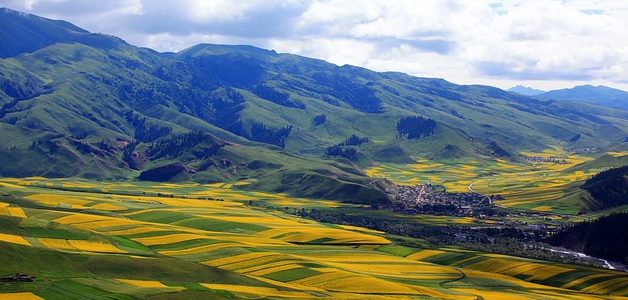October 10, 2016
China’s agriculture industry is on the cusp of a sea change, evidenced by a recent multi-billion dollar commitment to the region’s rural farmland.
The Agriculture Development Bank of China and the country’s Ministry of Agriculture have earmarked $450 billion (3 trillion yuan) for local agriculture, which will be allocated via loans, over the course of the next five years, GAI News has learned.
“All indications are that in addition to food security, increasing efficiency (productivity) and improving rural incomes are priorities,” Krishna Kumar, senior economist at RAND tells GAI News. “Increasing output and food security via improvements in productivity is crucial since it means you are producing more with the same land and other resources.”
Kumar goes on to say:
“If indeed the investments are directed toward efficiency-increasing activities such as better seed (also mentioned as a priority), and increasing farmer training to more effectively use inputs such as fertilizers, this will make China more productive in the global agriculture and agro-products market. Productivity is the engine of growth and competitiveness.”
China’s government underwent a change in the administration several years ago, and this new leadership seems to have a more aggressive approach to modernizing the country’s agriculture.
Meanwhile, in May China performed a slew of bond sales in the debt capital markets, the result of which appears to be the $450 billion in committed loans, sources suggest.
Erlend Ek, agriculture and marine manager at China Policy, explains to GAI News the way the capital will be divided: first to market-friendly institutions that will support a completely new agriculture system for futures trading, second to financial institutions such as lenders and lastly, insurance companies. This transformation, particularly toward a more structured futures market for agriculture commodities trading, reflects China’s shift in focus from a domestic approach to one that is more global in nature.
“The futures markets are on their way to being more regulated in China. In the future the government will support the gap between the target price [set by the futures markets] and the market price,” says Ek. “This more regulated approach will benefit the professionals. Now China is creating a more market friendly environment and this will increase China’s competitiveness.”
The Investment
The $450 billion commitment, which will take the form of financial products, comes on the heels of an agreement between China’s Ministry of Agriculture and the Development Bank. The funds will target rural areas and are designed to modernize the country’s agriculture system, which has suffered from a lack of accountability, sources say.
One of China’s goals is to transform the country’s farmland to a higher standard via systems such as irrigation monitoring and new technology in the form of drones, for instance. Ironically, Ek points out, nearly three-quarters, or 70 percent, of the earmarked funds won’t be directed toward the farmers despite the fact that China’s agriculture is in great need of investment. Instead the capital will go toward other industries where there will be a “spillover effect” into agriculture.
“Cement. Sand. Construction, machinery and labor. This is where the money will be going to. They need irrigation systems but that requires a lot of cement. There is an over capacity of cement in China, and they see agriculture as a sector which can digest the overcapacity from other sectors they are looking at this from a comprehensive economy,” says Ek.
The billions of dollars in funds for agriculture are expected to make a notable impact. Previously government-sponsored funds were allocated directly to farmers, and there was a lack of accountability with the results. “Now [government officials] are much more clever. The funds are going to a credit bank so they can give loans to the farmers. If farmers want loans they need to repay and be more efficient with the investment,” says Ek, adding that capital directed at insurance companies will ensure production of crops, etc. “It will not be as stupid as before,” he quips.
Meanwhile, China is also in the midst of change in connection with farmland ownership. Before the country’s rural land was owned by the farmers themselves. There’s been a shift in the law so that farmers and collective units can now rent out their use of the farmland from professional enterprises, such as institutional investors.
“Professional enterprises can come in and size up the farmland and invest in the land. They haven’t been allowed to do that until now,” says Ek, adding that financial products will tilt toward the new professional enterprises. “I think this will have a massive effect on the global economy. It’s a huge leap for China to make fundamental changes very quickly. This fund is big enough to have enough liquidity to fix problems. We will see what comes.”
Ek characterizes the reform as “very significant” and says recent changes represent a shift in China’s approach to agriculture from domestic to global in nature, which will make China more competitive with the world on agriculture.
“They realize they can’t produce all of the food themselves. Before they were very much focused on self-sufficiency,” Elk says. The new policy, he goes on to say, is about partnering with neighboring countries for trade and imports to offset high production costs while still maintaining China’s own ag production capacity in the event of any geopolitical strains.
—
GAI News Staff

Let GAI News inform your engagement in the agriculture sector.
GAI News provides crucial and timely news and insight to help you stay ahead of critical agricultural trends through free delivery of two weekly newsletters, Ag Investing Weekly and AgTech Intel.




